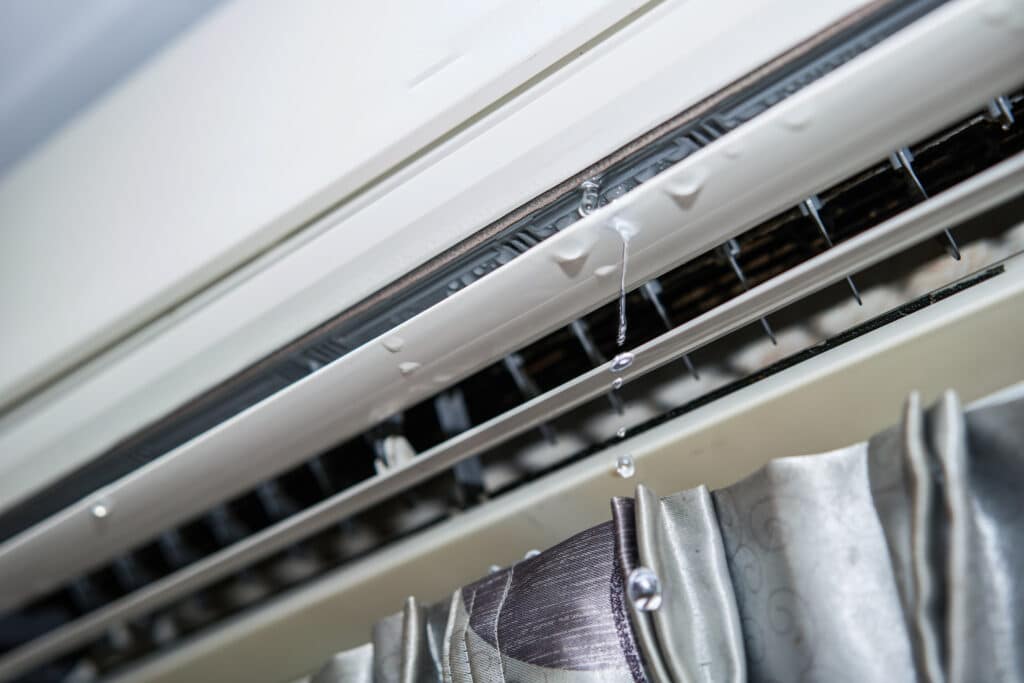
Most homeowners will experience an air conditioner (AC) leaking water at some point. If unaddressed, this common problem can lead to more severe issues, such as reduced AC performance, water damage to ceilings, walls, and floors, and even mold. Learn why your AC may be leaking water and what steps you should take next in this guide.
Why Water Forms in Your Air Conditioner
An air conditioning unit doesn’t actually cool air. Instead, it removes heat and transfers it outside. Most HVAC systems use two units to cool your home: an inside and an outside one.
The standard cooling process for an AC system is as follows:
- The vent with an air filter attached, known as the return vent, sucks warm indoor air from your living areas and blows it over the evaporator coil.
- Cold refrigerant, a mixture of different chemicals inside the evaporator coil, absorbs the heat and turns the refrigerant into hot gas. The now-cool air is blown back into the living areas through other vents, called supply vents, by a fan.
- The system sends the hot gas to the compressor outside. This device adds pressure, making it an even hotter vapor.
- Finally, hot gas reaches the condenser. This device releases heat outside and cools the refrigerant again. The refrigerant, now a cold liquid again, returns inside to absorb more warm indoor air.
During the step when hot air blows over the coils, condensation starts to form. This condensation drips into a drain pan that leads to a condensate drain line. This line leads the water out of your home. When the system is working properly, you shouldn’t have issues with your AC leaking inside.
Why Water Leaks From Your Air Conditioner
Unfortunately, things don’t always go according to plan. If your AC unit starts leaking water, there are a few possible reasons. We’ll examine them in more detail below.
Broken Condensate Pump
If your furnace and indoor AC unit are installed in your basement, a condensate pump sends the water outside. If that pump breaks, the water won’t be pumped outside anymore and will start to build up. You’ll need to repair or replace the pump, which is a task best handled by a professional.
Clogged Drain Line
A clogged condensate drain line is a common problem if your AC leaks inside. Over time, the drain pipe can become clogged with debris such as dirt, dust, or mold. This means water can’t escape your plumbing system and drain outside.
You can unclog the drain line using a wet/dry vac to remove debris. This should remove anything causing a clog, freeing the line to allow water to escape again. If the wet/dry vac doesn’t work, you may need to call a professional.
Damaged Drain Pan
The AC’s drain pan may be damaged or rusted due to old age, allowing water to fall through. If your air conditioner is more than 15 years old, you may need to replace the pan.
Dirty Air Filter
Check your air filter to see if it’s dirty and needs to be changed. You should do this every one to three months. Dust and debris block airflow over the evaporator coil, causing the coil to freeze too cold. Once the ice melts, it drips excess water that the drain pan may not be able to handle.
Low Refrigerant
Your air conditioning system might be low on refrigerant. One sign of this is if your air conditioner isn’t effectively cooling your house. Another is a hissing or bubbling noise, which indicates a refrigerant leak. Depending on the severity of the leak, you may need to replace your whole AC unit.
Like a dirty air filter, low refrigerant can cause your evaporator coil to freeze over. The evaporator coil will also freeze when your AC system has lower pressure. When the ice melts, it creates excess water. This issue is best handled by a professional used to dealing with refrigerants.
Contact an HVAC Professional
You can change out an air filter or drain pan on your own, but any other AC repair is best handled by a professional. An AC expert can correctly diagnose the problem and handle it before it gets out of hand. A professional can also take preventive measures, such as installing a float switch, to help with potential future leaks.
How Do I Stop My AC From Dripping Water in the Future?
One of the best steps you can take to maintain your AC system is to replace your old, dirty air filters with new ones. You should also routinely check the drain pan. Both of these components can throw off your entire system’s internal workings, leading to water leaks.
Clogged air vents also cause leaky air conditioners, so do your best to keep these vents clear from debris. Avoid covering the vents with clothing, curtains, or anything else. Check your system’s air filters, vents, and drip pan every one to three months or as indicated by your AC’s instructions.
Frequently Asked Questions About ACs Leaking Water
When to Consider a Broader Home Inspection
When purchasing or selling a home, it is critical to complete a thorough inspection to understand the condition of the property. A standard home inspection includes an assessment of a home’s systems and physical structure. After the process, the inspector will provide a report detailing their findings and recommendations.
If you are thinking about buying a home or putting your home on the market, we strongly recommend finding an ASHI home inspector in your area.

